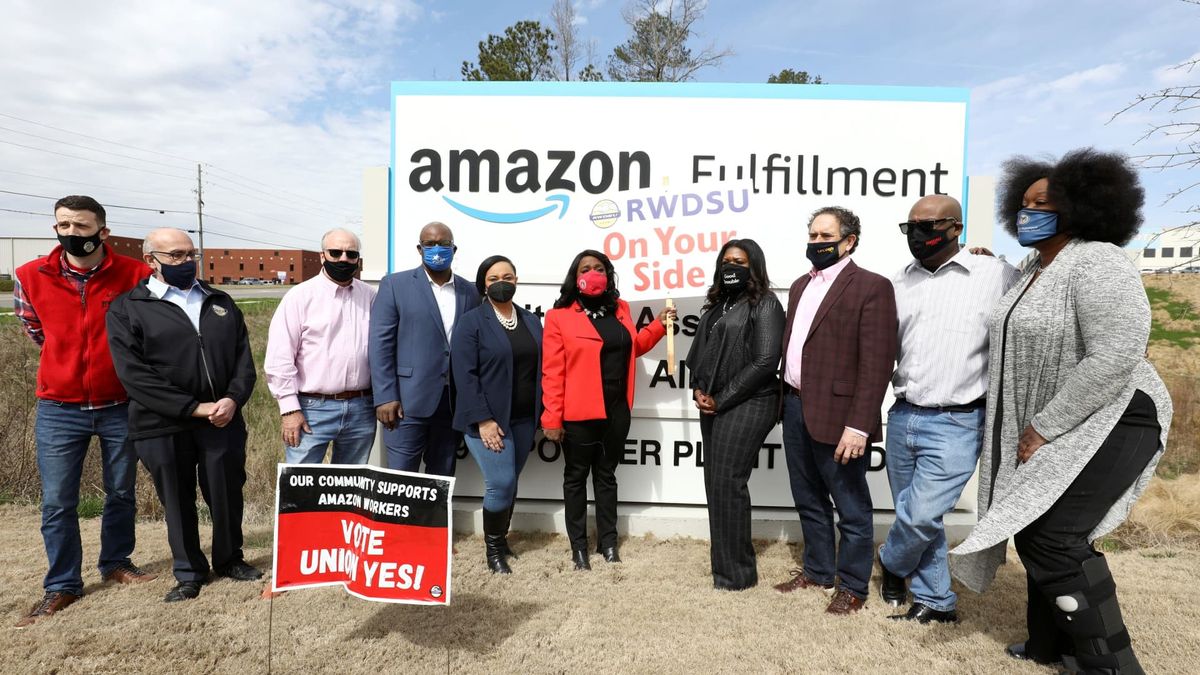With Amazon winning the union vote in Alabama, what’s next for workers’ rights in America?

A few minutes every morning is all you need.
Stay up to date on the world's Headlines and Human Stories. It's fun, it's factual, it's fluff-free.
After the vote in Alabama, union leaders and organizers have turned their gaze elsewhere.
On April 9, reports emerged that Amazon workers at a plant in Bessemer, Alabama, had voted heavily in opposition of joining a union, squandering one of the most significant unionization efforts in the company’s history.
Almost 1,800 votes were cast against forming a union, compared to the less than 740 votes in favor of forming the union, indicating that the conditions many Democrats saw as perfect for progress in workers rights had been greatly misinterpreted.
Amazon.com, Inc. has brushed off claims that it had intimidated workers to vote against the formation of a union by forcing workers to attend anti-union meetings and bombarding them with text messages and anti-union posters in warehouse bathrooms.
“It’s easy to predict the union will say that Amazon won this election because we intimidated employees, but that’s not true,” a statement from the company’s blog read. “Our employees heard far more anti-Amazon messages from the union, policymakers, and media outlets than they heard from us. And Amazon didn’t win—our employees made the choice to vote against joining a union.”
The union is also challenging more than 500 votes because of the circumstances surrounding the installation of a United States Postal Service mailbox that was put in place just outside of the warehouse.
“Amazon knew full well that unless they did everything they possibly could, even illegal activity, their workers would have continued supporting the union,” Stuart Appelbaum, the RWDSU’s president, said in a statement.
But the 505 votes being challenged still don’t have the potential of flipping the verdict, even in the event that the ballots do get overturned.
Senator Bernie Sanders of Vermont, an open union and labor advocate, lamented the loss in a tweet on April 9, saying that, “The history of every struggle in this country tells us that we do not always win the first time out. But I believe, as a result of their courage, workers in Alabama will inspire significant growth in union organizing efforts around the country.”
In the tweet, Sanders also attacked Amazon’s tactics used to win the vote and supported the calls for investigations by the retail, wholesale and department store union (RWDSU).
Amazon had appeared to be in a vulnerable spot after seeing intensified tension around the world over its massive size and reportedly poor working conditions. The election of President Joe Biden, who supported the union effort, was a signal to hopeful labor advocates that the tide might be turning.
Last year, a union in Germany organized strikes around the country to protest the poor health and safety guidelines being implemented in Amazon warehouses. In the United Kingdom, union advocates made similar claims, calling warehouses a “hive of infection” after workers tested positive.
And in California, the passage of proposition 22, which would consider ride-hailing drivers and other gig workers “independent contractors” rather than employees of the company that contracted them (such as Uber or Lyft), was a major loss for labor advocates who had hoped to push the envelope for gig workers in the US.
But similar battles have been settled quite differently in some places. Earlier this year, the UK Supreme Court ruled that drivers for Uber Technologies, Inc. are considered “workers” and are entitled to the same rights, such as a minimum wage and benefits, as other workers across the country. A French court issued a similar ruling in March 2020. Both rulings were a win for labor advocates globally and fueled optimism about the unionization effort in Alabama.
The failure to form a union in Alabama, though, was reminiscent of a decadeslong string of unsuccessful and expensive moves to form unions at Walmart Inc., the only company that employs more people than Amazon and one that would fall under the scope of the RWDSU in union situations. After the vote in Alabama, union leaders and organizers have turned their gaze elsewhere.
Washington Democrats, who fully supported the unionization efforts, are now looking at increased attention to pass legislation that would support workers. The Protecting the Right to Organize, or PRO Act, passed the House of Representatives in March, but is unlikely to pass the Senate due to a likely Republican filibuster.
“Workers cannot organize to scale in America absent labor law reform, full stop,” Michigan Representative Andy Levin said in an interview.
President Biden doesn’t seem shy to push on the subject either, openly condemning union-busting techniques.
“There should be no intimidation, no coercion, no threats, no anti-union propaganda,” he said.
Have a tip or story? Get in touch with our reporters at tips@themilsource.com




Comments ()